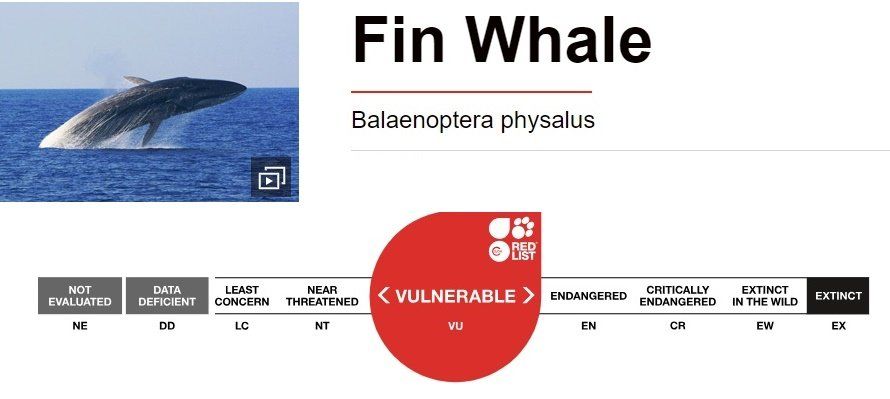Fin whales now less protected as moved to "Vulnerable"on the IUCN Red List for Threatened Species.
Populations of fin whales are on the rise, according to a new report by the International Union for the Conservation of Nature-IUCN, who have said their numbers have almost doubled since 1970 and there are now estimated to be 100,000 adults.
Fin whales ( Balaenoptera physalus)
are the second largest animal to have ever lived, second only to the blue whale ( Balaenoptera musculus).
At a pinnacle in human history when more than 60% of wildlife has been declared threatened with extinction, the "greyhounds of the sea" appear to be making a come back.
The latest report has given a population estimate of 100,000 mature fin whales worldwide, illustrating the power of conservation efforts. Fin whales were once hunted to the brink of extinction, but this month they have been moved from "Endangered" to "Vulnerable" on the IUCN Red List of Threatened species. The change was based on predictions of the global mature population size, with a view that whaling is now "under control".
A global ban on commercial whaling in 1986 has helped the population recover in recent years. However, fin whales are not in the clear yet, with countries such as Iceland and Japan, still hunting whales and a plethora of other human impacts such as noise and pollution which are cumulative. International agreements and various protective measures are also to thank for the success of fin whale conservation efforts.
According to the IUCN, 26,500 species are threatened with extinction, including 40% of amphibians, 25% of all mammals, 31% of sharks and rays and 14% of bird species. Classifications on the IUCN Red List of Threatened Species include; Least Concerned, Near Threatened, Vulnerable, Endangered, Critically Endangered, Extinct in the Wild and Extinct.
It is evident from the killings of two endangered blue whale ( Balaenoptera musculus)/ fin whale hybrids by Icelandic whaling company Hvalur hf, that the whaling industry is by far well regulated, with apparent misidentification of cetacean species. Numerous International Treaties prohibit whaling yet a few nations such as Norway, Iceland and Japan persist despite global disapproval. According to permits issued by the Icelandic government the company Hvalur Hf can kill fin whales, but not blue whales, which is a clear violation of Icelandic law.
Regardless of the global ban on whaling, Iceland have killed nearly 900 fin whales since they resumed whaling in 2006. Up to 145 fin whales were killed this last summer alone. Not only does hunting whales to sell for meat to Japan bring human ethics on health to light, considering whale meat is highly toxic due to heavy pesticide and heavy metal levels such as mercury,it also raises concerns for animal welfare.
Fin whales can swim up to 26 knots, causing an exhaustive and drawn out hunt that results in a lot of stress for the animal. In Addition, fin whales can reach 22 meters in length and it often takes more than one harpoon to cause a long a painful death. Read more about how humans have stressed whales through the ages here: https://www.orcireland.ie/post-title1
Whales play a vital role in the health of our Oceans, to which human health is dependant upon. The oceans provide us with up to 50% of our oxygen and helps combat climate change by acting as a carbon sink and sustaining fish stocks that feed millions of people through-out the world. If you would like to support our mission of ocean conservation in Ireland and want to help stop whaling, please consider becoming a member or making a donation at www.orcireland.ie.
References:
Cooke, J.G. 2018. Balaenoptera physalus . The IUCN Red List of Threatened Species 2018 : e.T2478A50349982.
SHARE THIS ARTICLE















